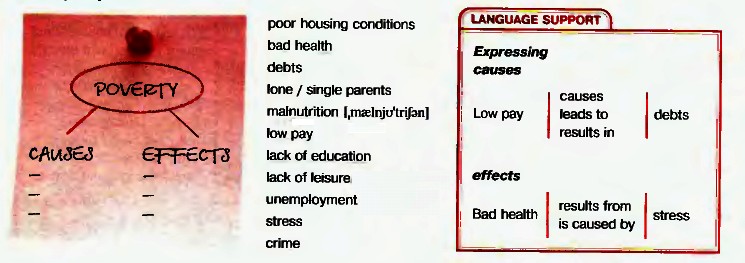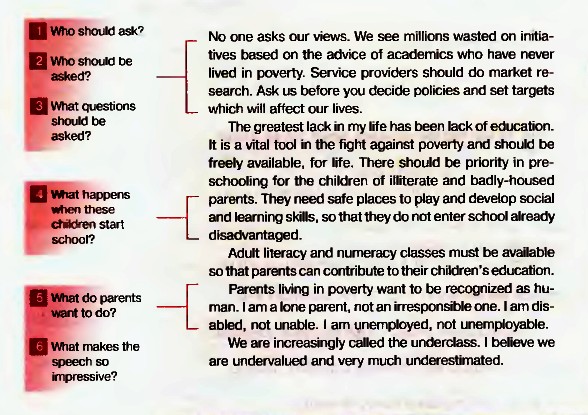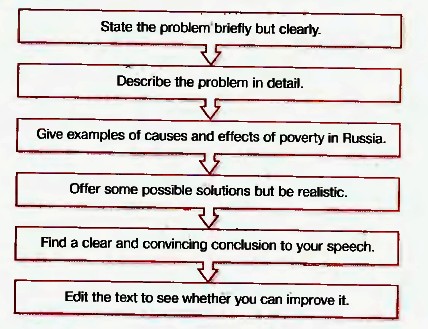|
Гипермаркет знаний>>Английский язык>>Английский язык 10 класс>> Fighting for life
Lessons 3-4 Fighting for life
Warm-up
1. Look at the picture and say.
1 Why do you think these peopleare living here?
2 How do you feel about them?
3 Do you want to help them?

Vocabulary
2. In your copybook divide the list below into two categories: causes and effects of poverty.
Explain your choice.

Listening
3. A. You are going to listen to and read a speech given by a woman called Moraene.
Read the title and try to predict what kind of change she will mention,
Note your predictions down.

B. look at the list of causes and effects of poverty in ex. 2.
Which of them do you think Moraene will mention in her speech? Tick in your list.
listen to the first part of the speech and tick the points you guessed right.
C. listen to the same part again and decide whether these statements are true (T) or false (F):
1 Moraene is married, She cannot work because of bad health.
2 The place where she lives IS safe.
3 Poverty made her feel depressed.
4 Moraene says that poor people are deprived of human rights.
5 Moraene has a good relationship with her son.
6 Moraene has no tIme to go to the theatre.
.............................................................
- disabled
- burglary
- free facilities
- taking active part in society
- eating leftovers
- getting in touch with a charity
- fighting for one's human
- rights
- sharing experience
..............................................................
D. What are Moraene's key points?
Use the expressions from the box and the cause - effect scheme in ex, 2 if necessary.
Example: Getting in touch with a charity can help.
Reading
4. A. Read the second part of Moraene's speech and answer the questions on the left. See whether your interpretation of the title was correct.

GLOSSARY
policy - a course of action
target - aim
vital - extremely important
priority - the lhing that you think is most important
disadvantaged - находящийся в худшем положении, чем другие
literacy - the state of being able to read and write
numeraq - the ability to do arithmetic
B. What would you do to solve the problem of poverty if you decided policies and set targets in your country?
Vocabulary
5 A. Match the words from the speech with their definitions and answer the questions.
1 What prefixes are used to give them a negative meaning?
2 Which of them does Moraene use to describe herself?

B. Complete the sentences with the words from the list.
a) Moraene suffers from poverty. She has a lot of problems because she is a ... parent.
b) Moraene is seriously ill and she is registered ....
c) She can't find a job, So, she is ....
d) But in her opinion, she is not... as she is able and ready to work.
e) But she insists that it doesn't mean she is ... to bring up her children.
Language work
6 A. What do the following sentences have in common?
1 Sharing experience can help.
2 For all of us, living in poverty has meant giving up rights and choices.
3 Trying to get help for my older son was a total failure.
B. Look through the text in ex. 4A and find the passages, which can be related to the following statements.
1 Listening to academics is a waste of time and money.
2 Politicians should base their pOlicies on the experience of listening to poor people.
3 Fighting against poverty is difficult without an education.
4 Educating parents is another way of helping children.
5 Children from poor families need additional training before entering school.
C. Use V-ing forms to complete the sentences 1-3. For the sentences 4-6 use your own ideas.
1 ... will make it easier for disadvantaged children to get education. (organise new schools)
2 ... will enable parents to contribute to their children's education. (learn to read and count)
3 ... no will help them to cope with poverty, (ask a chanty for help)
4 ... is not always easy for me
5 ... am tired of ... .
6 ... will help me in the future.
Writing
7. Write a speech about the problems of poverty in your country and ways of solving them. Follow these steps.

Speaking
8. Make the speech. Refer to ex. 7.
O. Л. Гроза, О. Б. Дворецкая, Н. Ю. Казырбаева, В. В. Клименко, М. Л. Мичурина, Н. В. Новикова, Т. Н. Рыжкова, Е. Ю. Шалимова, Английский язык нового тысячелентия, Учебник английского языка для 10 класса общеобразовательных учреждений. — 2-е изд. — М. Титул, 2004. — 175 с, ; ил.
Полный перечень тем по классам, календарный план согласно школьной программе по английскому языку онлайн, видеоматериал по английскому языку для 10 класса скачать
Содержание урока
 конспект урока конспект урока
 опорный каркас опорный каркас
 презентация урока презентация урока
 акселеративные методы акселеративные методы
 интерактивные технологии
Практика интерактивные технологии
Практика
 задачи и упражнения задачи и упражнения
 самопроверка самопроверка
 практикумы, тренинги, кейсы, квесты практикумы, тренинги, кейсы, квесты
 домашние задания домашние задания
 дискуссионные вопросы дискуссионные вопросы
 риторические вопросы от учеников
Иллюстрации риторические вопросы от учеников
Иллюстрации
 аудио-, видеоклипы и мультимедиа аудио-, видеоклипы и мультимедиа
 фотографии, картинки фотографии, картинки
 графики, таблицы, схемы графики, таблицы, схемы
 юмор, анекдоты, приколы, комиксы юмор, анекдоты, приколы, комиксы
 притчи, поговорки, кроссворды, цитаты
Дополнения притчи, поговорки, кроссворды, цитаты
Дополнения
 рефераты рефераты
 статьи статьи
 фишки для любознательных фишки для любознательных
 шпаргалки шпаргалки
 учебники основные и дополнительные учебники основные и дополнительные
 словарь терминов словарь терминов
 прочие
Совершенствование учебников и уроков прочие
Совершенствование учебников и уроков
 исправление ошибок в учебнике исправление ошибок в учебнике
 обновление фрагмента в учебнике обновление фрагмента в учебнике
 элементы новаторства на уроке элементы новаторства на уроке
 замена устаревших знаний новыми
Только для учителей замена устаревших знаний новыми
Только для учителей
 идеальные уроки идеальные уроки
 календарный план на год календарный план на год
 методические рекомендации методические рекомендации
 программы программы
 обсуждения
Интегрированные уроки обсуждения
Интегрированные уроки
Если у вас есть исправления или предложения к данному уроку, напишите нам.
Если вы хотите увидеть другие корректировки и пожелания к урокам, смотрите здесь - Образовательный форум.
|
















